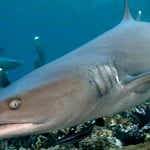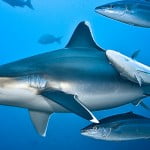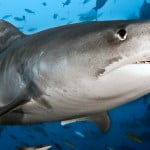World Wide Fund for Nature WWF is one of the world’s largest and most respected independent conservation organizations, with over 5 million supporters and a global network active in over 100 countries.
WWF’s mission is to stop the degradation of the earth’s natural environment and to build a future in which humans live in harmony with nature, by conserving the world’s biological diversity, ensuring that the use of renewable natural resources is sustainable, and promoting the reduction of pollution and wasteful consumption.
WWF has been present in the South Pacific since 1995 working to protect the region’s exceptionally rich marine biodiversity, which is threatened by human activity. Most of our work is conducted in the Fiji Islands, with our office based in Suva.

Sharks – Restoring the Balance
Sharks – Restoring the Balance
Sharks: mythologized, feared, revered. These ancient predators capture our imaginations. But sharks are in trouble – victims of irresponsible and unsustainable fishing practices. The decline of sharks spells trouble for the ocean. Removing these key predators from the food chain has serious consequences for marine ecosystems, which in turn has repercussions for people everywhere.
Modern forms of sharks and rays first emerged over 150 million years ago. But the introduction of modern fishing techniques has spelled disaster for these ancient creatures. Overfishing has caused massive decline in shark numbers – a huge jolt to ocean ecosystems in little over 50 years. The most serious declines have been in the Coral Triangle and Mediterranean.
In response to threats facing sharks and rays, WWF and TRAFFIC have created Sharks: Restoring the Balance an initiative to improve management of shark fisheries, reduce demand and move international trade in sharks and rays toward sustainability. We aim to ensure both sharks and rays are fished sustainably, yielding practical benefits for people without compromising marine ecosystems. Where populations have dropped too low to be sustainably fished, complete protection may be the only answer.
A number of offices in WWF and TRAFFIC have existing projects to conserve sharks and rays.
For more information on World Wide Fund for Nature WWF
Mr Ian Campbell, WWF Global Shark Programme Manager, WWF-Pacific, phone: +679 331 5533
Ms Vilisite Tamani , Communications Officer, WWF-Pacific, phone: +679 331 5533
Great Fiji Shark Count into its fifth year https://t.co/hyxhxv8XS3 via @sharethis
— WWF Sharks 🦈 (@WWF_Sharks) November 9, 2016














